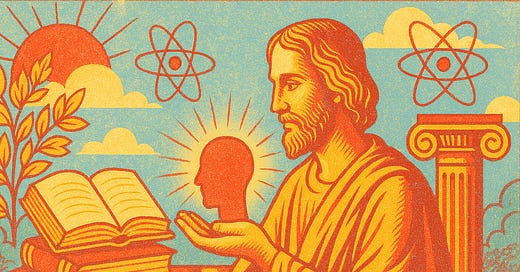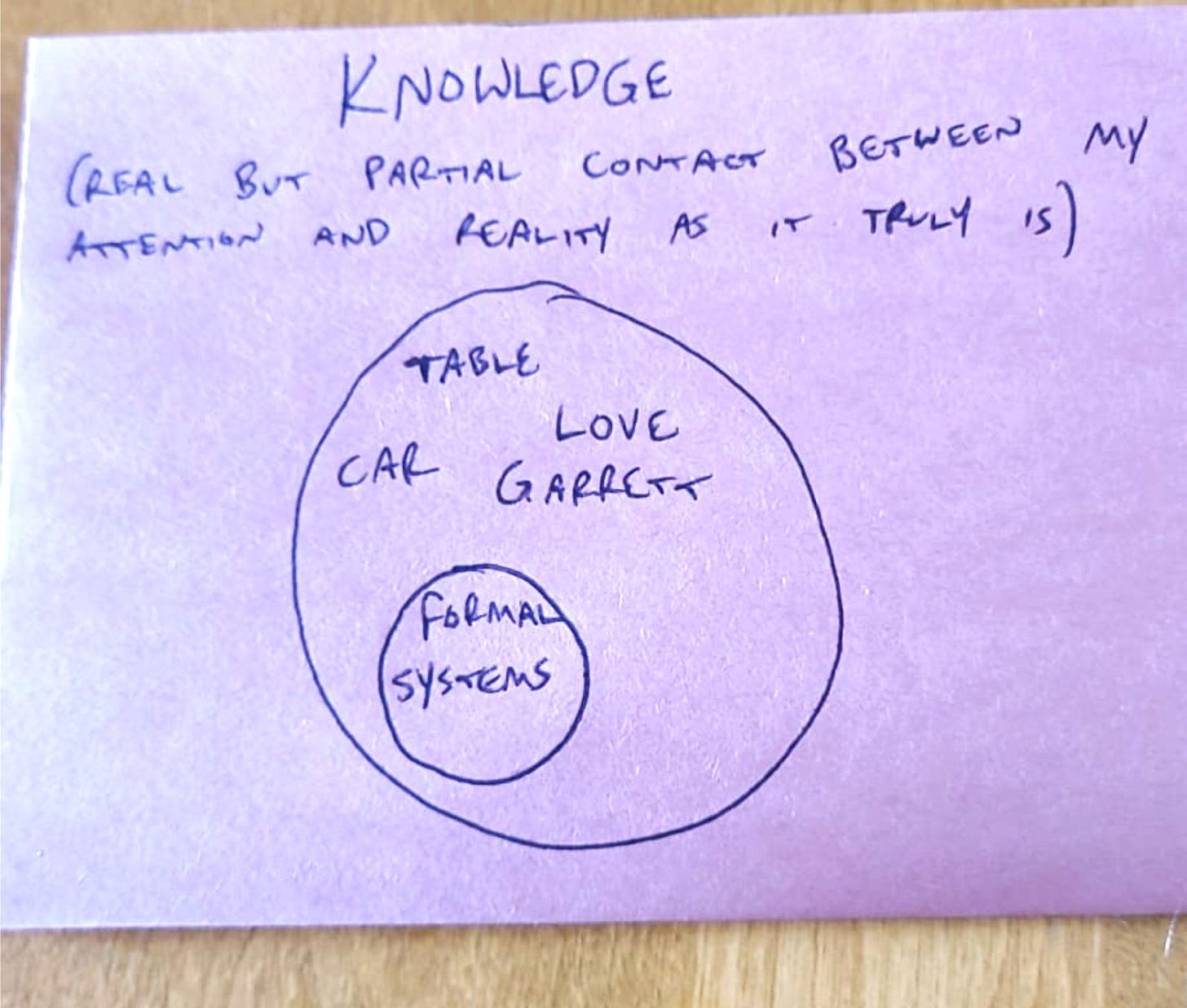A Christian, Gödel, and a Finite Mind walk into a bar...
The following was a conversation from yesterday between a dear friend of mine, Matthew Widen.
The following was a conversation from yesterday between a dear friend of mine, Matthew Widen, who was spurred both by my latest post on Misinterpretations of Gödel's Theorem, and by his Eastern Orthodox Christian standpoint.
Several people had similar questions in the comments, and since dialogue narratives can be powerful (see my facetious post on “What is light?”), this hitherto private conversation felt like a valuable addition to share.
Matt generously gave his permission.
Enjoy.
Matthew Widen: , good Substack. I’ve adjusted accordingly.
I think when people use Gödel to apply to epistemology, they aren’t trying to prove something; they’re just making a simile, which is valid.
Can’t I still say, “The meaning of our words relies on a higher logic, just like how in mathematics a formal system cannot be proven from within the system”?
Curt Jaimungal: Good point. I'd say that for a simile to be illuminating, there needs to be some relevant similarity between the things being compared.
Gödel’s theorem shows that in consistent formal systems capable of expressing basic arithmetic (blah blah etc.), there are true statements that can’t be proven within the system. However, our understanding of language and meaning doesn’t seem to function like a formal system. When one says, “The meaning of our words relies on a higher logic,” what exactly does that mean? In formal systems, there are precise definitions of “proof,” “axiom,” and “truth.” What’s the analogous precision in the case of linguistic meaning? Without that precision, the simile becomes indistinct and loses its power.
Also, linguistic meaning isn’t derived from axioms and inference rules (not as far as I can tell). It seems to come at least partially from social practices, conventions, and perhaps even something else entirely. The mechanisms by which words acquire meaning are fundamentally different from how theorems are derived in formal systems.
If one wants to make claims about linguistic meaning requiring some “higher logic,” that’s a super substantive philosophical position that needs its own arguments. In my view, appealing to Gödel’s theorem via simile doesn’t actually provide support for such a statement about higher logics and meaning.
These are my present deliberations.
Matthew Widen: Okay. I’m just missing one part then.
Since our knowledge of mathematics is finite, how do we avoid the problem that our definitions, even precise definitions within a formal system, are only linguistic approximations?
You’re saying the precise definitions in formal mathematical systems are definitions we have real contact with. But we don’t have the same kind of real contact with the definition of “table” or “car”?
Curt Jaimungal: Math definitions within formal systems are precise NOT because we have “more real contact” with them, but because they’re deliberately constructed TO BE precise (within their context). They’re stipulative. We explicitly define what terms mean within the system.
By contrast, words like “table” or “car” derive meaning from usage, social practices, and whatnot, like “fuzzy boundaries” or something mystical if one wants to say so. Either way, it’s not a stipulative definition. Even John Vervaeke points this out by saying for anything complex, we don’t give a “feature list” to define it. In math, you do give feature lists to define terms.
The imprecision of non-math isn’t due to “less contact” or “more contact,” at least not necessarily. That’s something I’m not touching on…
Matthew Widen: This all makes sense. It’s just their context I’m throwing into question, like throwing a table into question… This is how I’m seeing it…
If our knowledge of “table” is fuzzy, how is our knowledge of formal systems not fuzzy? I’m questioning us, not questioning the truth of the formal system.
If this is just a completely ignorant question with an obvious answer, you can just tell me so and don’t feel the need to catch me up, haha.
Curt Jaimungal: There are two notions here: one is the knowledge of the formal system being fuzzy, and the other is our knowledge of the consequences of the formal system being fuzzy.
The latter is the case (that’s what I was stating in the article).
If you believe the former, then Gödel’s theorem STILL doesn’t tell you anything new anyhow because you already thought formal systems were fuzzy to begin with.
Matthew Widen: Okay. Got it. I think I first want to make the claim about the limitations of our logic. Then I want to use Gödel’s theorem not as a proof but as an example of that claim.
Is that valid?
Curt Jaimungal: It depends on what you mean by limitations of logic. What exactly do you mean? Because recall, Gödel’s theorem assumes the formal system is well-defined, etc. So if you are removing that well-definedness, then Gödel’s theorem doesn’t apply anyhow.
Matthew Widen: I see your point. I’ll tell you what I mean and see if there’s still an honest way to apply Gödel to my claim.
Curt Jaimungal: Sure, no problem. Take your time.
Matthew Widen: I mean our logic is real but partial.
To me, that’s a Christian incarnational claim about how the infinite fills the finite—like how a stick explains a shadow but not the other way around. Whereas I don’t like the way people assume that our knowledge could be certain (as opposed to partial) or illusory (as opposed to real).
Modernism is like a desire for certainty, postmodernism a desire for unreality. Neither of these rest on the incarnation. Instead, I prefer the ancient way found in Greek philosophy but completed in the Incarnation: that our knowledge of everything is always partial and always real.
Curt Jaimungal: Is “partial” in this context when applied to logic a synonym for “finite”?
Matthew Widen: Yes.
Curt Jaimungal: Gödel’s incompleteness assumes infinity.
Because otherwise, you could enumerate the theorems (since it’s a finite list) and just manually check if something is included there or not.
Matthew Widen: Ah, it assumes a type of infinite knowledge, you mean. That’s why Gödel’s theorems shouldn’t even be used as a simile to the rest of our knowledge?
Curt Jaimungal: Well, “knowledge” is tricky there. I just mean that the concept of infinity is baked into the construction of something called the Gödel sentence, which Gödel uses to prove his theorem. This is why logicians / mathematicians always say “assume arithmetic.” In that assumption of arithmetic, you can always add and multiply higher and higher numbers without bound. If there were a bound (if it were finite), then Gödel’s theorem wouldn’t work.
I want to hear from you in the Substack comment section below. I read each and every response.
—Curt Jaimungal
PS: Matt interviewed me several years ago. I cringe to watch because anything of me more than 2 months old I wince deeply at, let alone 4 years old at this point, but perhaps you’ll find it useful or entertaining. Here it is. Matt’s a good interviewer. Topics are knowledge, belief, agnosticism, ego, idealism vs. materialism, and what it means to “seek truth.”







Curt, feel free to share this with Matt.
Does Krishnamurti's statement 'truth is a pathless land' apply to mathematics?